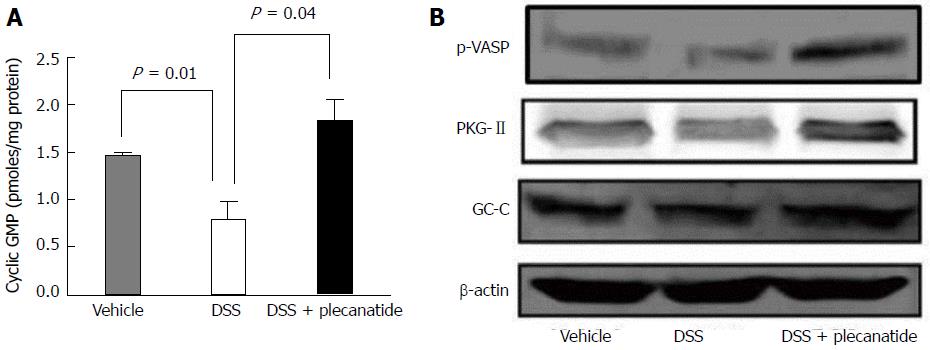Copyright
©The Author(s) 2017.
World J Gastrointest Pharmacol Ther. Feb 6, 2017; 8(1): 47-59
Published online Feb 6, 2017. doi: 10.4292/wjgpt.v8.i1.47
Published online Feb 6, 2017. doi: 10.4292/wjgpt.v8.i1.47
Figure 3 Orally administered plecanatide activates guanylate cyclase-C signaling within the colon.
Effect of plecanatide on (A) stimulation of cGMP production and (B) expression of phosphorylated VASP, PKG-II and GC-C in colon tissues from Apc+/Min-FCCC mice with DSS-induced acute inflammation (n = 6/group). Mice with acute inflammation were administered plecanatide (2.5 mg/kg) by oral gavage; a dose equivalent to that ingested daily by animals fed a diet supplemented with 10 ppm plecanatide in the main tumorigenesis study. Colon tissue (1 cm) from 6 animals per group was pooled to prepare cell lysates. Intracellular cGMP levels depicted in (A) are expressed as pmoles/mg protein ± SEM. Student t test was used to evaluate differences in cGMP between treatment groups. P values ≤ 0.05 were considered statistically significant. Representative Western blot analyses of phospho-VASP, PKG-II and GC-C were performed using appropriate antibodies. To demonstrate equivalent protein loading for each condition, membranes were probed subsequently with β-actin antibody. GC-C: Guanylate cyclase-C; GMP: Guanosine monophosphate; p-VASP: Phospho-vasodilator-stimulated phosphoprotein; PKG-II: Protein kinase G-II.
- Citation: Chang WCL, Masih S, Thadi A, Patwa V, Joshi A, Cooper HS, Palejwala VA, Clapper ML, Shailubhai K. Plecanatide-mediated activation of guanylate cyclase-C suppresses inflammation-induced colorectal carcinogenesis in Apc+/Min-FCCC mice. World J Gastrointest Pharmacol Ther 2017; 8(1): 47-59
- URL: https://www.wjgnet.com/2150-5349/full/v8/i1/47.htm
- DOI: https://dx.doi.org/10.4292/wjgpt.v8.i1.47









